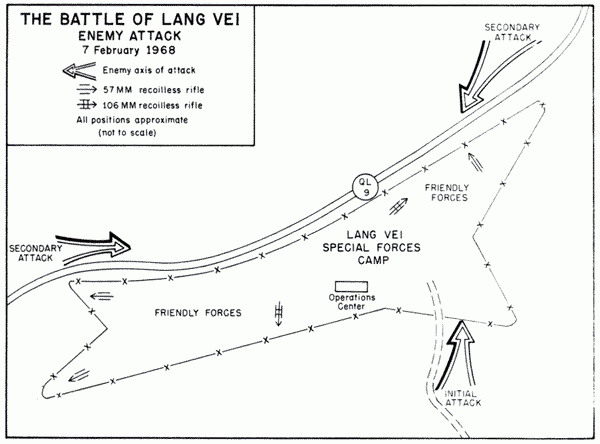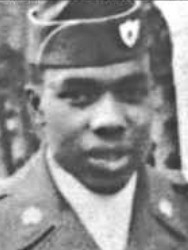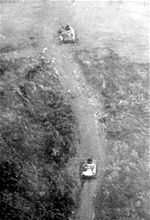In the opening week of the 1968 Tet Offensive, a U.S. Special Forces Camp was overrun by North Vietnamese tanks and infantry. The camp commander, all the Special Forces officers, and many of the allied fighters were trapped in the camp’s command bunker. Airborne Sfc. Eugene Ashley, Jr. rallied 80 allied Laotian troops and led five relief attacks to free his comrades. He was awarded the Medal of Honor for his valor in battle.
Khe Sanh, Tet Offensive
North Vietnamese Army (NVA) forces attacked the Special Forces Camp at Lang Vei, a few miles west of Khe Sanh. Repeated requests for a relief force were rejected by the U.S. commander at Khe Sanh, who knew that additional NVA armored units lay in wait to ambush any relief forces. During the onset of the Tet Offensive, there were over 20,000 NVA troops pitted against the roughly 6,000 U.S. and allied troops in the Khe Sanh area.

The NVA forces had promised clemency to the American and South Vietnamese forces if they left the Camp Lang Vei bunker and surrendered. The South Vietnamese soldiers and officer surrendered, and were immediately slaughtered. NVA attackers then began throwing fragmentation and tear gas grenades into the bunker, but the U.S. forces remained.
Sfc. Eugene Ashley’s Assault Force
Sfc. Eugene Ashley recruited an assault force form among the Laotian forces who had fled the NVA attack on their camp a few days earlier. He called in close air support and artillery strikes for five repeated attempts to rescue the men trapped in the bunker. On his final assault he called for strikes nearly on his own position. This finally forced the NVA besiegers to withdraw, and left him in control of the hill.

Ashley was wounded several times by machine gun fire, but kept fighting without regard to his safety. On his fifth and last rescue attempt he lost consciousness and was carried away by his men. While they were treating his wounds, he was killed by fragments from an enemy artillery round.
Sfc. Ashley’s repeated rescue attempts diverted the enemy from attacking the bunker. Eventually he forced the NVA to retreat from the bunker, and allowed the men a chance to escape. They fled through the gap his attacks had created in enemy positions, and were rescued from a nearby clearing.
Sfc. Eugene Ashley was a veteran of the Korean War also. He was 37 when he died. A high school in his home town of Wilmington, NC, was named after him when it opened in 2001, to honor his memory, his heroism, and his sacrifice.
Citation
Sfc. Ashley, distinguished himself by conspicuous gallantry and intrepidity while serving with Detachment A-101, Company C. Sfc. Ashley was the senior special forces Advisor of a hastily organized assault force whose mission was to rescue entrapped U.S. special forces advisors at Camp Lang Vei. During the initial attack on the special forces camp by North Vietnamese army forces, Sfc. Ashley supported the camp with high explosive and illumination mortar rounds. When communications were lost with the main camp, he assumed the additional responsibility of directing air strikes and artillery support. Sfc. Ashley organized and equipped a small assault force composed of local friendly personnel. During the ensuing battle, Sfc. Ashley led a total of 5 vigorous assaults against the enemy, continuously exposing himself to a voluminous hail of enemy grenades, machine gun and automatic weapons fire. Throughout these assaults, he was plagued by numerous booby-trapped satchel charges in all bunkers on his avenue of approach. During his fifth and final assault, he adjusted air strikes nearly on top of his assault element, forcing the enemy to withdraw and resulting in friendly control of the summit of the hill. While exposing himself to intense enemy fire, he was seriously wounded by machine gun fire but continued his mission without regard for his personal safety. After the fifth assault he lost consciousness and was carried from the summit by his comrades only to suffer a fatal wound when an enemy artillery round landed in the area. Sfc. Ashley displayed extraordinary heroism in risking his life in an attempt to save the lives of his entrapped comrades and commanding officer. His total disregard for his personal safety while exposed to enemy observation and automatic weapons fire was an inspiration to all men committed to the assault. The resolute valor with which he led 5 gallant charges placed critical diversionary pressure on the attacking enemy and his valiant efforts carved a channel in the overpowering enemy forces and weapons positions through which the survivors of Camp Lang Vei eventually escaped to freedom. Sfc. Ashley’s bravery at the cost of his life was in the highest traditions of the military service, and reflects great credit upon himself, his unit, and the U.S. Army.

















